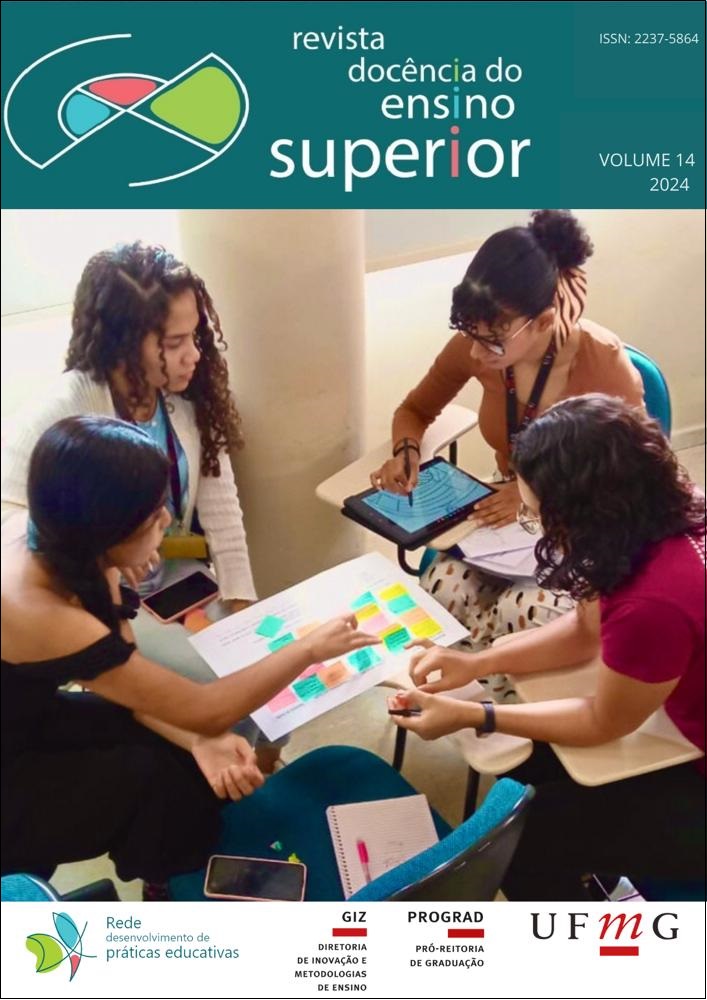The teaching of sciences in the post-graduation in Education
doing teaching with other territorialities and multiple pedagogies
DOI:
https://doi.org/10.35699/2237-5864.2024.48391Keywords:
science teaching, other pedagogies, plurality, territorialitiesAbstract
This text is an essay and aims to present the expansion of possibilities of knowledge production for science teaching. Such possibilities are realized in spaces where I work as a professor in graduate programs at a federal university in the Northeast of Brazil. The classes become territories of interaction between me and the students for the exchange of experiences that broaden our view of the diversity of knowledge constituted in other pedagogies, which are woven in the relationship of men and women with their territory that, even though they are made absent by a model of science of modernity, emerge in the experience. Consequently, the teaching-learning movements of the classes I teach are also curricular updates on themes and contents present in the research objects of the students, aiming to dialogue with a pluralistic science teaching. Decolonial references from Popular Education and postmodernism allowed the weaving of the text, whose methodology is made up of narratives referring to learning that I built from experiences with two traditional communities, one of babassu coconut breakers and the other fisheries, from different parts of the Brazilian territory. The results show that other pedagogies, present in fishing communities and babassu coconut breakers, bring us closer to a diversified reading of the world, enabling paths for a more plural science teaching, based on a multiplicity of knowledge.
Downloads
References
ALVES, Nilda. Cultura e cotidiano escolar. Revista Brasileira de Educação. 2003, n. 23, p. 62-74. DOI: https://doi.org/10.1590/S1413-24782003000200005.
ARROYO, Miguel González. Outros Sujeitos, Outras pedagogias. 2. ed. Petrópolis: Vozes, 2014.
BURNHAM, Teresinha Fróes; FAGUNDES, Norma Carapiá. Transdisciplinaridade, Multirreferencialidade e Currículo. Revista da FACED, Salvador, n. 5, 2001. DOI: https://doi.org/10.9771/2317-1219rf.v6i5.2837.
CAPRA, Fritjof. A teia da vida. São Paulo: Cultrix, 1997.
DOLL JUNIOR, William. Currículo: Uma perspectiva Pós-Moderna. Porto Alegre: Artes Médicas, 1997.
ESCOBAR, Arturo. O Lugar da natureza e a natureza do lugar: globalização ou pós-desenvolvimento? LANDER, Edgardo (org.). In: A colonialidade do saber: eurocentrismo e ciências sociais – Perspectivas latino-americanas. Buenos Aires: Clacso, 2005.
FREIRE, Paulo. Pedagogia da autonomia. Rio de Janeiro: Paz e Terra, 2010.
HAESBAERT, Rogério. Território e Multiterritorialidade: um debate. In: Geografia. n. 17, Rio de Janeiro: Universidade Federal do Rio de Janeiro, 2007. DOI: https://doi.org/10.22409/GEOgraphia2007.v9i17.a13531.
hooks, bell [Gloria Jean Watkins]. Ensinando a transgredir: a educação como prática da liberdade. São Paulo: Martins Fontes, 2013.
KRENAK, Ailton. Ideias para adiar o fim do mundo. Companhia das Letras. 2. ed. 2019.
LARROSA, Jorge. ABCEDÁRIO com Jorge Larrosa Bondía. Youtube, 10. jul. 2017. Disponível em: https://www.youtube.com/watch?v=5FtY1psRoS4&t=256s.
LATOUR, Bruno. Políticas da natureza. Como fazer ciência na democracia. Tradução de Carlos Aurélio Mota de Souza. Bauru, SP: Edusc, 2004.
LITTLE, Paul. Etnodesenvolvimento local: autonomia cultural na era do neoliberalismo global. Tellus. ano 2, n. 3, p. 33-52, 2002. Campo Grande. DOI: https://doi.org/10.20435/tellus.v0i3.23.
PEDAGOGIA. In: Michaelis. Dicionário Brasileiro da Língua Portuguesa. Disponível em: https://michaelis.uol.com.br/moderno-portugues/busca/portugues-brasileiro/pedagogia/. Acesso em: 24 mai. 2024.
PIMENTA, Selma Garrido. Para uma re-significação da didática-ciências da educação, pedagogia e didática (uma revisão conceitual e uma síntese provisória). Didática e formação de professores: percursos e perspectivas no Brasil e em Portugal. São Paulo: Cortez, p. 19-76, 1997.
SANTOS, Milton. Por uma outra globalização: do pensamento único a consciência universal. 10. ed. Rio de Janeiro: Record, 2003.
SANTOS, Boaventura de Sousa. A Gramática do Tempo: para uma nova cultura política. 3. ed. São Paulo: Cortez, 2010.
SCIENTIA. In: Michaelis. Dicionário Brasileiro da Língua Portuguesa. Disponível em: https://michaelis.uol.com.br/moderno-portugues/busca/portugues-brasileiro/ciencia/. Acesso em: 8 nov. 2022.
VIEIRA, Fábio Pessoa. Envolvimento e Educação Ambiental com as quebradeiras de coco: Um caminho sustentável na reserva extrativista do Extremo Norte do Tocantins. 2017, p. 199. Tese (Doutorado em Ciências do Ambiente), Universidade Federal do Tocantins, Palmas, 2017.
VIEIRA, Fábio Pessoa; ACCIOLY, Miguel da Costa; SANTOS, Tayane Lopes. Mapeamento biorregional em comunidades pesqueiras: pertencimento territorial na costa do Nordeste brasileiro frente à impactos ambientais. Revista Campo-Território, v. 17, n. 47, p. 105-129, 2022.
Published
How to Cite
Issue
Section
License
Copyright (c) 2024 Fábio Pessoa Vieira

This work is licensed under a Creative Commons Attribution 4.0 International License.
Authors who publish in this journal retain the copyright and grant the journal the right of first publication, with the work simultaneously licensed under the Creative Commons Attribution License which allows the sharing of work with acknowledgment of authorship and initial publication in this journal.
Authors are authorized to take additional contracts separately, for non-exclusive distribution of the version of the work published in this journal (e.g. publish in institutional repository or as a book chapter), with acknowledgment of authorship and initial publication in this journal.
Open access policy:
Revista Docência do Ensino Superior is an Open Access journal, which means that all content is available free of charge, at no cost to the user or their institution. Users may read, download, copy, distribute, print, search, or link to the full texts of the articles, or use them for any other legal purpose, without seeking prior permission from the publisher or author, provided they respect the license to use the Creative Commons used by the journal. This definition of open access is in line with the Budapest Open Access Initiative (BOAI).
























